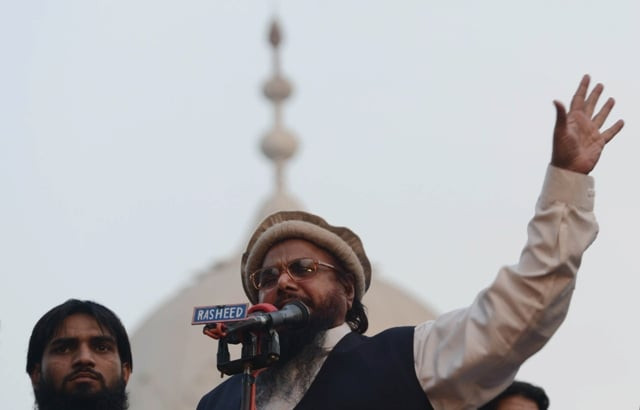US irked by release of Hafiz Saeed
State Department says it is ‘deeply concerned’ over JuD chief's release

Hafiz Saeed. PHOTO: AFP
“The United States is deeply concerned that Lashkar-e-Tayyiba (LeT) leader Hafiz Seed has been released from house arrest in Pakistan,” said a statement issued by the US embassy here.
It described the LeT as a designated Foreign Terrorist Organization responsible for the death of hundreds of innocent civilians including Americans in terrorist attacks.
“The Pakistani government should make sure that he is arrested and charged for his crimes,” the statement added, referring to Saeed.
In May 2008, the United States Department of the Treasury designated Saeed as a Specially Designated Global Terrorist under Executive Order 13224. Saeed was also individually designated by the United Nations under UNSC R1267 in December 2008 following the November 2008 Mumbai attack in which six American citizens were killed.
It said LeT and several of its front organisations, leaders, and operatives remain under both State Department and Treasury Department sanctions. Since 2012, the United States has offered a $10 million reward for information bringing Saeed to justice.
Hafiz Saeed calls Nawaz Sharif a 'traitor' for seeking peace with India
Saeed was released on Friday morning after the Lahore High Court rejected the government’s request seeking further extension in his house arrest. The review board of the High Court said there was not sufficient evidence to keep the Jamaatud Dawa chief under house arrest.
Saeed and four of his aides were detained in January this year after the government told a court they presented a threat to peace and security. The move was largely attributed to US pressure.
India has already reacted angrily to the latest court orders and accused Pakistan of continuing with a policy of “protecting non-state actors”. There was no formal reaction from Pakistan about his release, but officials privately said the government was left with no other option but to free him after the court order.



















COMMENTS
Comments are moderated and generally will be posted if they are on-topic and not abusive.
For more information, please see our Comments FAQ